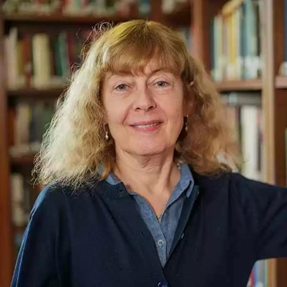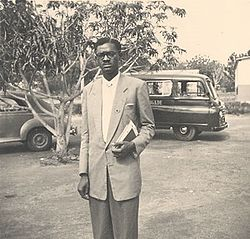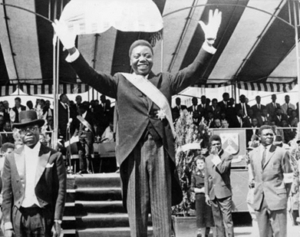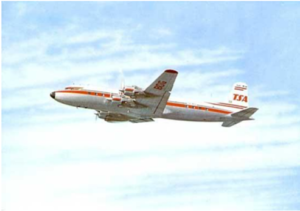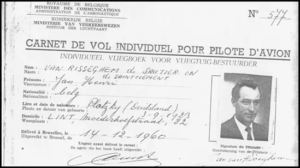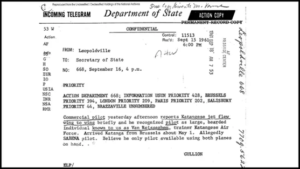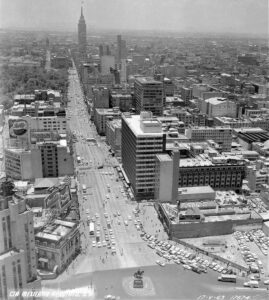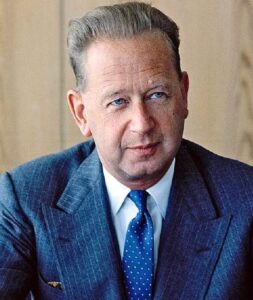
Dag Hammarskjöld, Secretary-General of the United Nations from April 1953 until his death in a plane crash in September 1961.
Dag Hammarskjold was the Secretary General of the United Nations from 1953 to 1961. He was awarded the Nobel Peace Prize posthumously for his work in Africa. He earned his doctorate in Economics from the University of Uppsala in Sweden, his native country. To my mind his greatest accomplishment was his role in the design and implementation of the welfare state in Sweden, a model that was followed by the neighboring Nordic countries. Which is why, in terms of standard of living, the Nordic countries have by consensus of academic economists, the best functioning economies in the world. but that’s a subject for a different blog. John F. Kennedy said of him,
“I realize now that in comparison to him, I am a small man. He was the greatest statesman of our century.”
He was also a poet, and in a couplet written as a young man he presaged his death saying,
Tomorrow we shall meet, Death and I –
And he shall thrust his sword into one who is wide awake.
I am well aware that the world right now is preoccupied with crises arguably more serious than matters of history. But I have just returned from a conference held at the Wecht Institute of Forensic Science on the campus of Duquesne University in Pittsburgh. The sponsor of the symposium was a group of which I am proudly a member, Citizens Against Political Assassinations. A cadre of subversives to be sure, nonetheless, we were welcomed by the Governor of Pennsylvania Josh Shapiro (by telecast); our keynote address was delivered by Professor Barbara Perry, presidential historian with the University of Virginia; our reception speaker was actor and activist, Alec Baldwin.
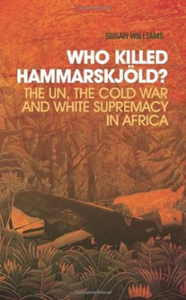 It was at the conference that I learned of the work of UK researcher, Dr. Susan Williams. She is the author of this new book. Available from Amazon, the jacket cover says the following.
It was at the conference that I learned of the work of UK researcher, Dr. Susan Williams. She is the author of this new book. Available from Amazon, the jacket cover says the following.
“One of the outstanding mysteries of the twentieth century, and one with huge political resonance, is the death of Dag Hammarskjold and his UN team in a plane crash in central Africa in 1961. Just minutes after midnight, his aircraft plunged into thick forest in the British colony of Northern Rhodesia (Zambia), abruptly ending his mission to bring peace to the Congo. Across the world, many suspected sabotage, accusing the multi-nationals and the governments of Britain, Belgium, the USA and South Africa of involvement in the disaster. These suspicions have never gone away. British High Commissioner Lord Alport was waiting at the airport when the aircraft crashed nearby. He bizarrely insisted to the airport management that Hammarskjold had flown elsewhere – even though his aircraft was reported overhead. This postponed a search for so long that the wreckage of the plane was not found for fifteen hours. White mercenaries were at the airport that night too, including the South African pilot Jerry Puren, whose bombing of Congolese villages led, in his own words, to ‘flaming huts …destruction and death’.
These soldiers of fortune were backed by Sir Roy Welensky, Prime Minister of the Rhodesian Federation, who was ready to stop at nothing to maintain white rule and thought the United Nations was synonymous with the Nazis. The Rhodesian government conducted an official inquiry, which blamed pilot error. But as this book will show, it was a massive cover-up that suppressed and dismissed a mass of crucial evidence, especially that of African eye-witnesses. A subsequent UN inquiry was unable to rule out foul play – but had no access to the evidence to show how and why. Now, for the first time, this story can be told. Who Killed Hammarskjold follows the author on her intriguing and often frightening journey of research to Zambia, South Africa, the USA, Sweden, Norway, Britain, France and Belgium, where she unearthed a mass of new and hitherto secret documentary and photographic evidence. At the heart of this book is Hammarskjold himself – a courageous and complex idealist, who sought to shield the newly-independent nations of the world from the predatory instincts of the Great Powers. It reveals that the conflict in the Congo was driven not so much by internal divisions, as by the Cold War and by the West’s determination to keep real power from the hands of the post-colonial governments of Africa. It shows, too, that the British settlers of Rhodesia would maintain white minority rule at all costs.”
By way of background, in 1960 the former Belgian Congo became the Republic of the Congo with Patrice Lumumba as its elected Prime Minister. But within months there was a revolt from within the military and a political puppet named Moise Tshombe established a base in the southern-most province Katanga. In short order the new nation devolved into chaos with looting and atrocities directed at the remaining Belgians and other Europeans. In response Belgium sent in military forces to protect their citizens, but instead of supporting the legitimate government they joined up with the rebel Katangans.
Researchers such as Williams believe that it was Belgian mining interests, specifically the conglomerate Union Miniere, that figured they could maintain the mineral rights for the especially rich Uranium deposits in Katanga with the amenable Tshombe regime as opposed to having to share the profits with the Congolese people. Most of the Belgians living in the Congo were employees of the Union’s Uranium mines. Some twenty years after the fact, the government of Belgium officially apologized for its role in the “Crisis of the Congo” as it came to be known.
To counterweight the balance of power, and as Secretary General, Hammarskjold ordered in 20,000 UN troops to support the legitimate government. Hammarsjkold undertook this action against heavy pressure from the western countries, including the USA, the UK, France, the Soviet Union, and of course Belgium. The UN effort failed. A squad of CIA funded mercenaries led by Joseph Mobutu, captured Lumumba and turned him over to Tshombe for execution. When an Irish batallion among the UN force was surrounded in September 1961 Hammarsjkold flew to Katanga to negotiate a ceasefire. It was on the return trip that his plane, a DC-6 crashed killing all aboard.
It was shortly after midnight that the plane attempted a refueling stop at the city of Ndola, Northern Rhodesia (now Zambia). On the approach, lower than it should have been, the plane struck the treetops on the hills south of the town, bursting into flames on impact.
Although the official investigation by the Rhodesian government concluded that the cause was pilot error, it was marred by limitations inherent to the colonial legal system. Under Apartheid, witness statements by black Africans are given no legal weight. An ad hoc investigation by a UN aid worker named Goran Bjorkdahl in 2007 turned up ten eyewitnesses who claimed that the DC-6 was attacked by a smaller plane and that it was on fire before it crashed.
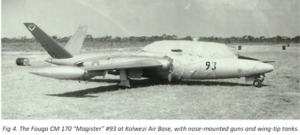 On that basis the UN undertook its own investigation in 2013, contracting with a Swedish crash expert Sven Hammersberg. Hammersberg specifically investigated the likelihood of a fighter plane attack. The only fighter planes that were in range were back in Katanga. The Belgians had provided the Katangans with a couple of flimsy, limited fire power jets called Fougas. They had a single machine gun mounted in the nose. Although Hammersberg could not rule out the possibility absolutely, as a former fighter pilot himself he considered the plot non-credible. First of all the distance would have been at the very limit of the Fougas fuel range, even if it had the supplementary wingtip fuel tanks mounted. The pilot would have been daring if not foolhardy to the point of suicidal. Secondly, the Fougas did not have radar, making contact with and targeting the DC-6 at night, not to mention landing and taking off in the dark, a formidable task. In interviewing the mercenary pilots they assured him that the Fougas were strictly used for daytime operations; they had never flown at night. Then there was the limited firepower, along with a lack of bullet holes in the wreckage.
On that basis the UN undertook its own investigation in 2013, contracting with a Swedish crash expert Sven Hammersberg. Hammersberg specifically investigated the likelihood of a fighter plane attack. The only fighter planes that were in range were back in Katanga. The Belgians had provided the Katangans with a couple of flimsy, limited fire power jets called Fougas. They had a single machine gun mounted in the nose. Although Hammersberg could not rule out the possibility absolutely, as a former fighter pilot himself he considered the plot non-credible. First of all the distance would have been at the very limit of the Fougas fuel range, even if it had the supplementary wingtip fuel tanks mounted. The pilot would have been daring if not foolhardy to the point of suicidal. Secondly, the Fougas did not have radar, making contact with and targeting the DC-6 at night, not to mention landing and taking off in the dark, a formidable task. In interviewing the mercenary pilots they assured him that the Fougas were strictly used for daytime operations; they had never flown at night. Then there was the limited firepower, along with a lack of bullet holes in the wreckage.
Nonetheless one of the mercenary pilots would subsequently claim to Swedish journalists that one of his colleagues, pilot Jan van Risseghem, had admitted to confidants that he had, on orders, shot down the UN plane. On further investigation Van Rissighem’s alibi in which he had told investigators that he was in South Africa on the night in question began to fall apart.
If so, who gave the orders? Was it the Belgians and the Union Miniere? Internal CIA cables indicate the US suspected the KGB of involvement. They too were interested in the yellow cake. But that could be a misdirection. In 2021 a French journalist Maurin Picard discovered a document in the files of the OAS, the Organisation Armeé Secrete; it was a death warrant for Hammarsjkold. The OAS was a cabal of generals within the French Foreign Legion during the early 1960’s. Their goal was to prevent French colonies, which they had fought to retain, from being freed. Their reign of terror ended when they were caught in the unsuccessful attempt to assassinate Charles DeGaulle in 1962. DeGaulle had supported the independence of Algeria. In fact, French mercenaries were among those training the Katangans. The document condemning Hammarsjkold translates as,
“It is high time to put an end to his harmful intrusion … this sentence common to justice and fairness to be carried out, as soon as possible.”
The CIA was working closely with the OAS in the sixties carrying out its own program of assassinations as revealed first by the 1977 Church Committee and more recently in the Wikileak documents.
Hollywood has caught up with the suspense with a dramatized version of the matter (produced in Sweden actually) released over christmas 2023 (link to clip here).
https://www.youtube.com/watch?v=wJddgX6ICvo
And that brings us up to the latest with Dr. Williams. She is the 2023 recipient of the Wyndham-Campbell prize for non-fiction literature awarded by Yale University. With it comes a stipend of $175,000 to continue her research. Which, by the way, she is conducting under the auspices of the United Nations which has an open investigation led by Judge Chande Othmann.
Naturally both the USA and UK have declined to cooperate. Which is why we, the Assassination Archives and Research Center, the largest repository of documents on such matters, have made our resources available (link here).
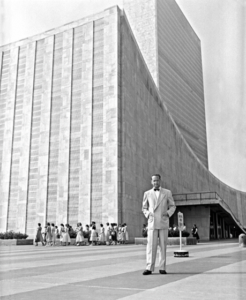 A fitting epitaph from another poem he wrote.
A fitting epitaph from another poem he wrote.
“Do not seek death. Death will find you. But seek the road which makes death a fulfillment.”
On the 29th of February 2024 there will be an online conference on Dag Hammerskjold’s plane crash sponsored by the Institute for Commonwealth Studies. A guest speaker will be journalist Marin Picard whose new book is scheduled for release this June, 2024.
And as a last word, so as not to dwell entirely on his death but in celebration of his life, I think Dag would appreciate these kind mentions from a scene in the movie the Normal Heart, “I belong to a culture…”
https://www.youtube.com/watch?v=X-vIBq2lTn0
Dr. Thomas is a board member of the AARC. He is the author of Hear No Evil: Politics, Science, and the Forensic Evidence in the Kennedy Assassination.
* * * * *
RELATED: 29 February 2024 Online Conference: Dag Hammarskjöld’s Plane Crash: The Continuing Search for Truth

